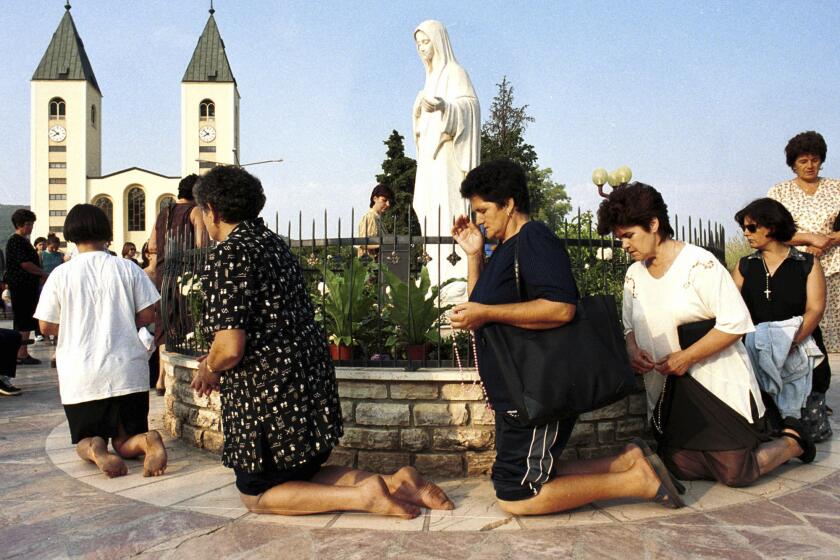Ready for Better East-West Ties, Kremlin Asserts
The Politburo, in its first reported meeting since Mikhail S. Gorbachev was named head of the Soviet Communist Party, declared Thursday that the Soviet Union is ready to pursue detente with the West, including closer ties with the United States.
The official Tass news agency said that “the experience of detente of the 1970s has proved that relations with capitalist countries can also develop well in the spirit of peaceful coexistence and cooperation, provided both sides are ready for it.”
“The Soviet Union is ready to follow this line,” Tass declared.
The Tass report gave no indication whether Gorbachev has formally replied to President Reagan’s invitation for a summit between the two leaders. Vice President George Bush personally delivered the invitation to Gorbachev last week when he flew to Moscow to attend the funeral of President Konstantin U. Chernenko.
Bush came away from the meeting with “high hopes” of improved Soviet-American cooperation. He added that he felt that Reagan would be ready for a summit meeting as soon as the Soviets would agree to it.
During a visit to Quebec this week, Reagan reportedly told Canadian Prime Minister Brian Mulroney that he favors a meeting with Gorbachev and said, “The ball is in their court.”
The Tass report was notable for its omission of the usual condemnation of Reagan’s Strategic Defense Initiative, the so-called “Star Wars” anti-missile program. The program, now in the research phase, has come under sharp attack almost daily in the Soviet media.
In another action, the ruling body approved a report on the U.S. visit of a Soviet delegation led by Politburo member Vladimir V. Shcherbitsky and said his trip has shown the importance of developing ties between the superpowers’ legislatures.
“The Political Bureau (Politburo) emphasized the importance of the further development of ties with the United States also along the lines of supreme legislative bodies, in the interests of improving mutual understanding and organizing mutually advantageous cooperation, in the interests of consolidating peace,” Tass said.
Earlier Thursday, however, Pravda, the official Communist Party newspaper, sent different signals toward the United States by publishing a strong attack on a speech Reagan made in Quebec.
The article accused Reagan of reverting to “blind anti-communism” in remarks made to a group of Canadian officials Monday. It was the strongest Soviet press criticism of Reagan in several months but fell far short of past accusations that he was a trigger-happy cowboy or another Hitler.
In his Canadian speech, the President charged that the Soviet Union was violating a number of treaties and agreements, including a ban on chemical weapons and the 1972 anti-ballistic missile treaty. These were his first public anti-Soviet comments after several months of conciliatory words about the Kremlin high command.
The Pravda article, written by well-known political commentator Tomas Kolesnichenko, compared the Quebec speech to Reagan’s remarks to the British Parliament in which he appealed for a “crusade” against communism.
“Just why did the American President at this particular moment have to repeat such harsh, absolutely groundless anti-Soviet inventions?” Kolesnichenko asked.
“The answer is clear,” he said. “The statement . . . is not just a chance outburst of emotions. It is a deliberate action designed . . . to cast a shadow on the progress of the Geneva negotiations.” Reagan was trying to justify a “tough American position” at the Geneva arms control talks, the Pravda commentator said, and wanted to make it more difficult to reach agreements with the Soviet negotiators.
The President’s most important aim, he added, was “to dampen hopes . . . for normalization of Soviet-American relations.”
More to Read
Start your day right
Sign up for Essential California for news, features and recommendations from the L.A. Times and beyond in your inbox six days a week.
You may occasionally receive promotional content from the Los Angeles Times.






